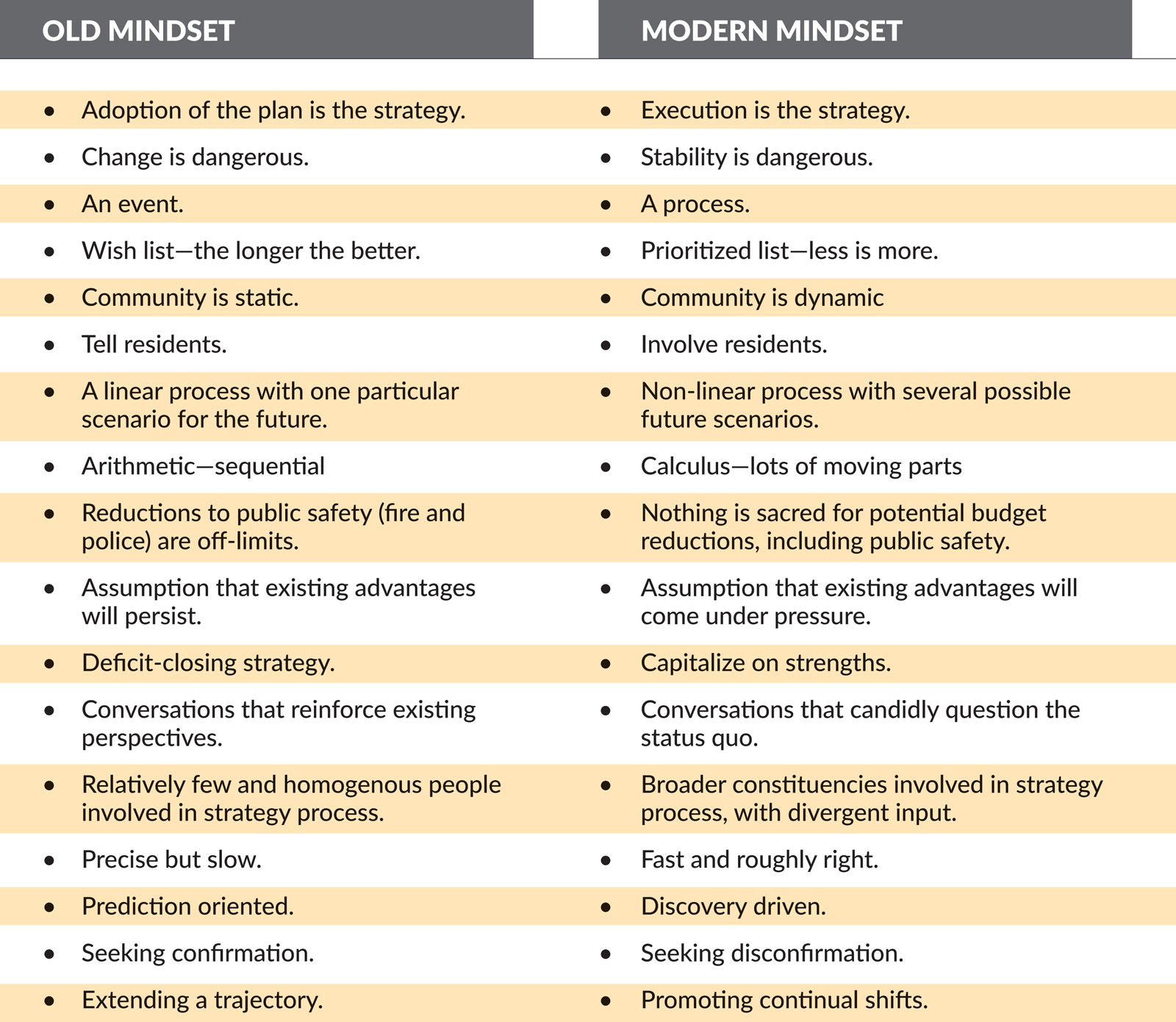
This is the third of my four-part series in which I focus on the numerous changes impacting local government. In this edition, I share why shifting conditions are prompting leaders to reimagine the future of their community. Instead of relying on strategic planning, they are utilizing a Futures Planning approach.
Local government directly affects the daily existence and quality of life for residents within the community. Local government leadership is about making things happen that might not otherwise happen and preventing things from happening that ordinarily might happen. It is a process that helps transform intentions into positive actions, visions into reality. The role of government is evolving, but the question is, in what direction is it moving?
As a result of recent events—economic volatility, shifting political winds, the COVID-19 pandemic, and disruptive innovation—I am experiencing an increased interest in strategic planning services by government leaders. In my initial discussion, we determine that instead of tying their community’s future to a strategy geared to a single set of events, smart management benefits from a deeper understanding of the present possibilities offered from multiple views about possible futures.
During periods of Turbulence, Uncertainty, Novelty, and Ambiguity (what the Oxford scenario planning approach refers to as TUNA conditions), communities and organizations frequently experience serious challenges that disrupt continuity of operations, financial stability, and community expectations. Such conditions can be unsettling and destabilizing on many different levels. But they also present opportunities for organizations to reframe their strategies and innovate. I refer to TUNA forces as headwinds and the purpose of Futures Planning is to convert those headwinds into a tailwind helping to accelerate your community toward realizing its potential. Navigating the path forward requires a disciplined balance of three actions: managing your present business, creating your future, and selectively unlearning the past.
The best strategic leaders anticipate where their business/community/organization is headed and see changes before others do. Far from being magicians, instead they shine at “outside-in thinking” that sharpens their ability to anticipate what is to come. They know their customers extremely well, foresee emerging trends, and understand changing dynamics. The headwinds for public sector agencies are daunting indeed, yet increasingly leaders are participating in strategic thinking processes that lead to planning for a number of futures.
The actions that position your community for the future differ from a “we’ve always done it that way” approach. Maintaining a healthy balance between the status quo and innovation is hard work. Striking the right balance between sustaining a legacy organization and building for the future requires judgment.

Increasingly, local governments are reconsidering their approach to strategic planning by referencing the following shift in mindset:
More and better budget planning is not the solitary factor available to you to mitigate the changes impacting your community and organization. I argue that people who lose weight are not always healthier because of it. The phrase “tighten your belt” is a cliché, and it has returned with vigor to local governments throughout the world. I offer that it’s time to “change your pants,” because you cannot cut your way to a better future.
Similarly, making across-the-board uniform budget cuts makes absolutely no sense. Some people might believe that it’s a fair and equitable approach, but in reality, the impacts in some operations can be enormous while in others negligible. Trying to decide priorities while you are trying to reconcile your budget is nearly impossible.
Healthier budgets do not guarantee better government nor does the opposite hold true—smaller budgets leading to ineffective government. I contend money/budget is not your organization’s most precious resource; time is—on what are elected officials and agency staff investing their time? In fact, increasing the number of employees does not always translate into improved productivity.
I have dedicated my entire career to advocating for high-quality responsive government, and I can also be one of its toughest critics. Accordingly, government does many things well, but knowing what to stop doing isn’t one of them. There are employees right now as you read this article, in your organization, working on assignments that really don’t matter in the scheme of what’s important, like producing reports no one reads. It’s not only a waste of time; it’s demotivating to those staff members.
I am a huge fan of Lewis and Clark, whose intent was to explore unknown spaces in their pursuit of building a nation. The Corps of Discovery, as they called themselves, had to continually create a new map as they reperceived their future, relying on a learn-it-all approach, teamwork, and cooperation to achieve their vision. The next chapter for your community is how it reimagines itself. Forwarding-looking leaders recognize linear strategic planning is a relic of the past. Similar to the Lewis and Clark expedition, a passionate curiosity and relentlessly inquisitive mind are the hallmarks of success in interpreting the changes occurring.
Whenever you face high uncertainty, you need to be creative as you navigate uncharted waters. But you also need to prepare your mind. Way more than polishing up your vision, modifying your mission statement, refreshing your values, revising goals, and setting new objectives, the value of the Futures Planning approach is that it’s less of a focus on identifying projects or getting to the “right” scenario, and more about discussing purpose and helping leadership understand that the future can be dramatically different from the present, while fostering a deeper understanding of the forces driving potential changes and uncertainties. The approach gives leaders the ability to reperceivereality. The dividend is to sharpen their capability to toggle between present reality and future possibility.
Recommended Approach for Futures Planning
There are three types of communities: First are those who set the bar low and take a roof shot; second are the ones who are reckless and take a wild shot; and the third are those who are ambitious and take a moon shot! Which of these describes yours? Moon shots do not begin with brainstorming clever answers. They start with the hard work of finding the right questions.
Have you ever noticed that the front windshield of your car or truck is larger than your rearview mirror? That is because it’s more important about where you’re going than where you’ve been. And that is why I refer to convening your elected and appointed officials as an advance instead of retreat. Few forums can have as powerful an effect on building a stronger community, increasing a shared understanding among key stakeholders, and overall enhancing relationships as well-executed Advance Sessions that focus on Futures Planning for the short- and long-term. Continually stimulating your thinking and self-reflection is a critical aspect of building and maintaining your advantage. You have to moisten your mind and have thoughtful, prudent discussions about the present and the future.
An Advance Session provides elected and appointed officials the opportunity to discuss topics and exchange ideas in a manner they normally don’t get to, in a way they often don’t get to, and while not an efficient discussion, it is productive. Keep in mind “no one washes a rental car” so enlisting elected officials in this type of discussion ensures they have “skin in the game,” which is crucial.
In exploring various futures, conversations among policy makers deal with two worlds—the world of facts and data, and the world of ideas and perceptions. Dialogue, conversation quality, and engagement allow people to experiment with ideas and perceptions by taking facts and data into imagined or speculative worlds for the future of your community.
The types of questions that may be asked during the Advance Session may include:
• What profound trends are or will influence our future?
• What is our direction and response to these shifts?
• How can we be both responsive and proactive?
• What aspects of the current strategic plan need to be modified?
• Are any changes to the strategic initiatives needed?
• How will we enlist residents in our journey?
• What types of services will residents require in the future that are not already provided? What might be required to fund and staff these services?
• How will we describe our desired results in measurable terms?
• What are the best ways and means to get there?
• What are the potential impacts from growth?
• Which of our processes and practices might need to change to serve a larger population?
• What types of infrastructure additions or expansions will be required to handle our anticipated growth? What financial resources are required to fund this work?
• What can we do to make our community more attractive for business expansion or development opportunities?
The outcome of these Futures Planning discussions is to help you construct and evaluate an array of options that offer a broader view of the landscape and possibilities for success. Exploring your community through various lenses helps build your capacity to be agile—possessing the balance and capability that enable you to shift focus, priorities, and resources to meeting changing circumstances.
Local governments must operate in a legacy world, meaning that you must be able to keep doing the nuts-and-bolts work at the core of the mission. But you also must be ready to succeed in a fast-changing environment, one that is difficult to predict.
The advantage now goes to those who don’t just learn to live with change, but who create change and fashion themselves as catalysts. The most effective leaders anticipate where their community is headed and see changes before others do.
Your community has tremendous untapped potential. Speaking of which, what is your community’s potential? It’s only limited by your collective imagination because the best days for your community are in front of it!

PATRICK IBARRA and his consulting firm, the Mejorando Group, are passionate about unleashing human potential (patrick@gettingbetterallthetime.com).
New, Reduced Membership Dues
A new, reduced dues rate is available for CAOs/ACAOs, along with additional discounts for those in smaller communities, has been implemented. Learn more and be sure to join or renew today!
